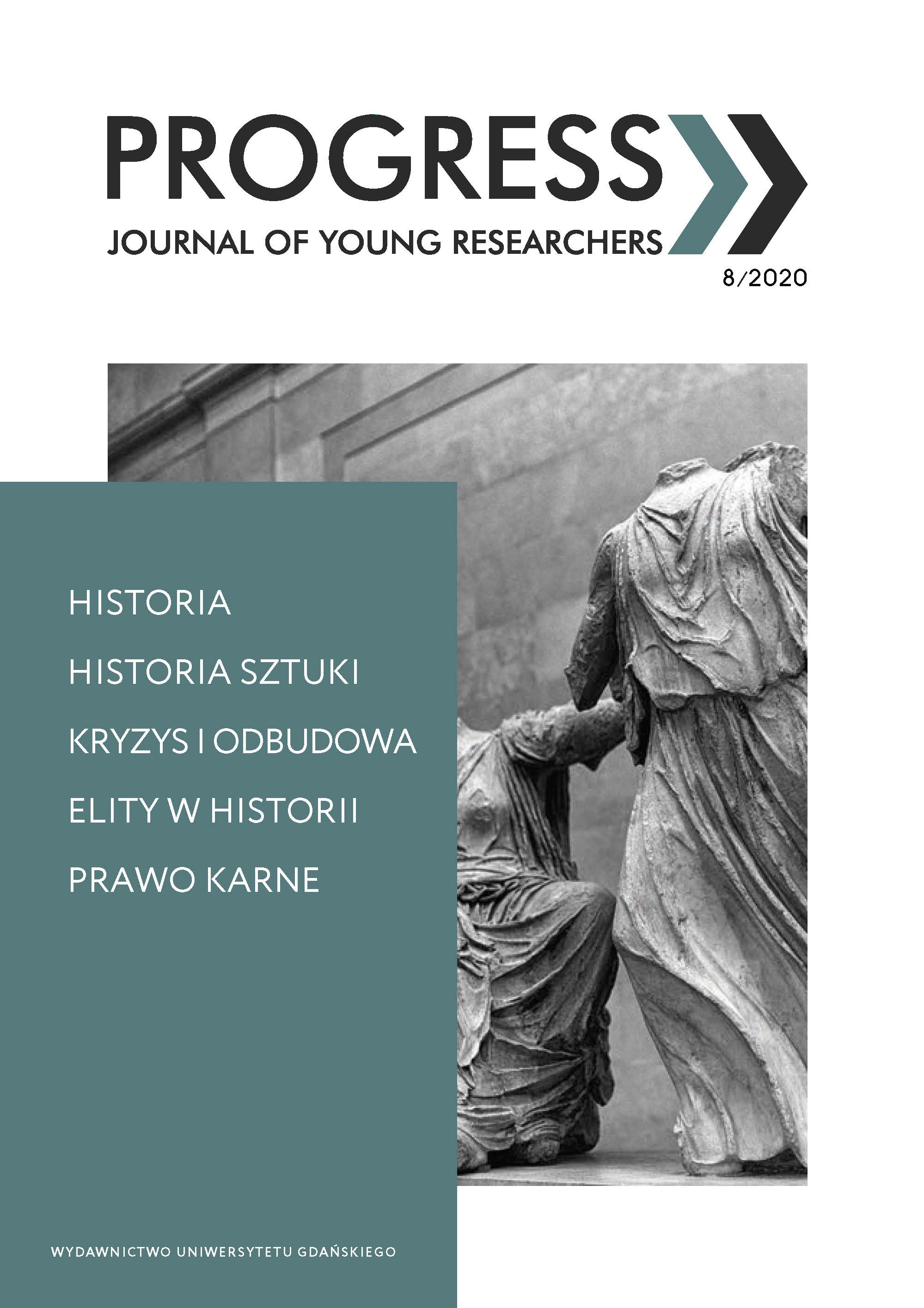The Matter of Reorganization of the Crown Army as Exemplified by Military Conscriptions in Kraków voivodeship, in the era of the Great Sejm
DOI:
https://doi.org/10.26881/prog.2020.8.05Keywords:
The Great Sejm, crown army, civil-military order commissions, history of the 18th centuryAbstract
The decentralization of the Polish-Lithuanian state and the disintegration of its administrative structures since the middle of the 17th century led to a decline in the importance of the Commonwealth in the international arena, and to limitation of its sovereignty. The only way to save the country was to follow the modern Western European countries, and adopt the enlightened governance standards from them. An attempt to rectify the system of the Polish state was made during the reign of Stanisław August Poniatowski (1764–1795); progressive reforms were introduced during the sessions of the general sejm in 1788–1792, later referred to as the Great Sejm, or the Four-Year Sejm. The law, entitled The Method of Recruitment in the Crown and the Grand Duchy of Lithuania was approved by the Sejm estates on December 7, 1789. The article On Recruitment was included in the constitution on the Crown Civil-Military Commissions – newly established institutions of local administration, which were to be responsible for military units stationed locally. In the years 1790–1792, two institutions of this type operated in the Kraków voivodeship: for the Kraków and Proszowice poviats with headquarters in Kraków, and for the Lelów and Książ poviats with headquarters first in Lelów, and then in Szczekociny. Despite numerous difficulties related to recruitment, of which primarily we should itemize problems such as numerous delays in the delivery of soldiers by the local authorities, unfitness of recruits for military service, irregular conscriptions, or local no remittal, the first conscription was ultimately a success of local administration. Subsequent attempts were not as smooth, in spite of the efforts of both institutions, such as those undertaken to fight desertion, and despite the fines. Despite the cessation of the activity of the Civil-Military Order Commissions in 1792, the members of the Targowica Confederation did not manage to totally nullify the reforms of the Great Sejm, which were largely restored by the administration of the Kościuszko Uprising in 1794 – including the conscription of recruits.
Downloads
References
Archival materials"
Archiwum Główne Akt Dawnych (AGAD):
– Archiwum Królestwa Polskiego (AKP) sig. 233
– Archiwum Sejmu Czteroletniego (ASCz) sig. 5
– Archiwum Skarbu Koronnego (ASK) sig. dz. 86
– Metryka Koronna (MK) sig. KK 92.
Archiwum Narodowe w Krakowie (ANKr.): sig. 29/30/1–4, 6–8, 11, 25–26, 30, 33, 38
Biblioteka Czartoryskich w Krakowie, sig. 968, 2178, 3188, 11614
Biblioteka Narodowa, sig. XVIII.3.8379
Zakład Narodowy im. Ossolińskich we Wrocławiu, sig. 9786/II, 11636/II.
Printed sources
Ludność żydowska województwa krakowskiego w czasie Sejmu Czteroletniego: spisy z powiatów krakowskiego, ksiąskiego, lelowskiego i proszowskiego z lat 1790–1792 ze zbiorów Archiwum Państwowego w Krakowie, 2008, ed. K. Follprecht, Kraków.
Volumina Legum, 1889, t. 9, Kraków.
Studies:
Baranowski I., 1907, Komisje porządkowe (1765–1788), Kraków: Rozprawy Akademii Umiejętności Wydziału Historyczno-Filozoficznego, t. 24.
Bucholc-Srogosz K., 2007, Departament Wojskowy Rady Nieustającej w latach 1775–1789 i 1786–1794, Poznań.
Czaja A., 1988, Między tronem, buławą, a dworem petersburskim. Z dziejów Rady Nieustającej 1786–1789, Warszawa.
Gordziejew J., 2002, Z dziejów Komisji Porządkowych Cywilno-Wojskowych w Wielkim Księstwie Litewskim, „Rocznik PAU i PAN w Krakowie”, r. 47.
Gordziejew J., 2010, Komisje Porządkowe Cywilno-Wojskowe w Wielkim Księstwie Litewskim w okresie Sejmu Czteroletniego (1789–1792), Kraków.
Jędrzejewski P., 2013a, Akta Komisji Porządkowych Cywilno-Wojskowych (1790–1794), „Krakowski Rocznik Archiwalny”, t. 19.
Jędrzejewski P., 2013b, Próby unowocześnienia administracji lokalnej, przemysłu i rewitalizacji miast w województwie krakowskim w dobie stanisławowskiej (1764–1795), „Annales Universitatis Paedagogicae Cracoviensis. Studia Historica”, t. 13.
Jędrzejewski P., 2015a, Wybrane źródła do administracji terenowej na przykładzie akt Komisji Porządkowych Cywilno-Wojskowych województwa krakowskiego (1790–1792) [w:] Zielonogórskie spotkanie młodych. Na tropie źródła i jego interpretacji, t. 1, eds. M. Dalidowicz, J. Dudek, A. Górski, ed., Zielona Góra.
Jędrzejewski P., 2015b, Komisarze Komisji Porządkowej Cywilno-Wojskowej dla powiatów krakowskiego i proszowickiego [w:] Jednostka i zbiorowość. Relacje na przestrzeni dziejów, eds. A. Orzełek, K. Jakimowicz, A. Sykała, Lublin.
Kalinka W., 1895, Sejm Czteroletni, t. 1, cz. 2, Kraków.
Korzon T., 1882, Komisje Porządkowe Cywilno-Wojskowe wojewódzkie i powiatowe w latach 1790–1792, t. 1, r. 7, z. 1, Kraków.
Korzon T., 1897, Wewnętrzne dzieje Polski za Stanisława Augusta 1764–1794, t. 2 i 5, Kraków-Warszawa.
Korzon T., 1975, Odrodzenie w upadku, Warszawa.
Nowak T.M., Wimmer J., 1981, Historia oręża polskiego 963–1795, Warszawa.
Pawiński A., 1888, Dzieje ziemi kujawskiej, Warszawa.
Ratajczak L., 1975a, Przezwyciężenie kryzysu militarnego Polski przed reformami Sejmu Czteroletniego, Warszawa.
Ratajczak L., 1975b, Wojsko i obronność Rzeczpospolitej 1788–1792, Warszawa.
Wielebska Z., 1987, Krakowska komisja porządkowa cywilno-wojskowa 1789–1794, „Rocznik Naukowo-Dydaktyczny WSP w Krakowie. Prace Historyczne”, nr 12.
Zarubin P., 2012, Żydzi w aglomeracji Krakowa w czasach stanisławowskich. Przemiany prawne, gospodarcze i społeczne, Kraków.
Downloads
Published
How to Cite
Issue
Section
License
Copyright (c) 2020 Author(s)

This work is licensed under a Creative Commons Attribution 4.0 International License.

 Academic Scientific Journals
Academic Scientific Journals




